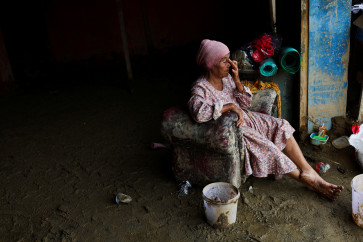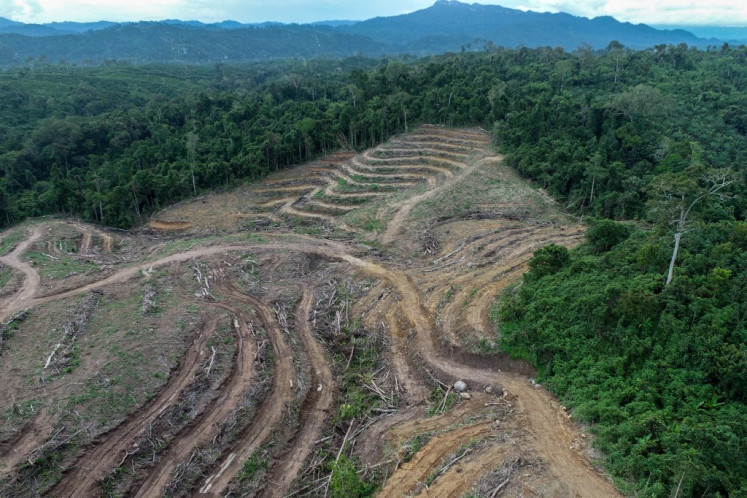Popular Reads
Top Results
Can't find what you're looking for?
View all search resultsPopular Reads
Top Results
Can't find what you're looking for?
View all search resultsRegulators call for efficiency measures for oil, gas companies
Ready to roll: Energy and Mineral Resources Minister Ignasius Jonan (center) gestures while acting oil and gas director general Joko Siswanto (left), Upstream Oil and Gas Regulatory Special Task Force (SKK Migas) chairman Dwi Sutjipto (second right), Indonesian Petroleum Association (IPA) vice presidents, Louise M McKenzie (second left) and Bij Agarwal look on during the opening of IPA Convention and Exhibition in Jakarta on Tuesday
Change text size
Gift Premium Articles
to Anyone
R
eady to roll: Energy and Mineral Resources Minister Ignasius Jonan (center) gestures while acting oil and gas director general Joko Siswanto (left), Upstream Oil and Gas Regulatory Special Task Force (SKK Migas) chairman Dwi Sutjipto (second right), Indonesian Petroleum Association (IPA) vice presidents, Louise M McKenzie (second left) and Bij Agarwal look on during the opening of IPA Convention and Exhibition in Jakarta on Tuesday. The event will run on Sept. 4-6. (Antara/Nova Wahyudi)
SKK Migas plans to introduce cluster system to boost efficiency
The government and the Upstream Oil and Gas Regulatory Task Force (SKKMigas) are urging oil and gas contractors to push for efficiency measures and reduce the cost of production and exploration amid declining global oil prices.
SKKMigas head Dwi Soetjipto said on Wednesday that the regulator was designing an area-based clustering system for all oil and gas producers so they can collaborate in reducing their cost burden.
“The system will consist of about seven clusters so that all companies [that operate in the same area] can synergize and make their businesses more efficient,” Dwi said during the opening ceremony of the 2019 Indonesia Petroleum Association Convention and Exhibition (IPA Convex) at the Jakarta Convention Center.
The clusters would span from the western part to the eastern part of the country for upstream, midstream and downstream industries that operate in the same block or area to synergize their operations, he added.
Oil prices have fallen around 20 percent since a 2019 peak reached in April, hit by concerns that the United States-China trade war will dent oil demand, Reuters reported. The current Indonesian Crude Price is reflective of the global trend, sitting at US$62.88 per barrel, below the government’s projection of $70 per barrel in the 2019 state budget.
The decline in the oil price has discouraged oil and gas businesses from investing in exploration.
Dwi said the cluster system could create a cost-sharing mechanism between different contract holders or companies in, for instance, building supporting infrastructure such as oil refineries or gas pipelines in a block.
This way, contractors from all streams could cut their costs significantly as they would bear the costs together, he added. To support the system, Dwi encouraged firms to implement an open-access mechanism that allowed them to jointly use their facilities together.
Dwi said the regulator would address contract sanctity issues, which are one of the main criticisms from business players in the oil and gas industry, by extending the notification period prior to a contract expiration so that oil and gas cooperation contract holders (KKKS) would get early certainty on their expiring contract status.
Oil and gas companies are also encouraged to utilize the latest technology during exploration and production activities to increase production volume and, thus, revenue, he added.
These necessary efforts would not only increase the contractors’ profits and production volume but also lure more global investors to participate in the sector. Up to August of this year, Dwi said SKKMigas had received a total of $8 billion in upstream oil and gas investment.
Energy and Mineral Resources Minister Ignasius Jonan also urged contractors to be more efficient during exploration and production as the current oil price was not as high as it was 10 years ago, and no one could find new oil reserves in the world.
“We know that the oil price is determined by supply and demand, but the global political conditions also play a factor in it,” Jonan told the press on the sidelines of IPA Convex.
Although the government has received $2.5 billion investment commitments in exploration from oil and gas companies this year, Jonan said more exploration activities needed to take place because so far, oil and gas firms had only explored half of Indonesia’s potential.
Dwi said that Indonesia had about 128 basins in the country, but only 54 of them had been explored.
“Most of them are in hard to reach places, like the deep sea. That’s why we need stronger investment to build the necessary infrastructure,” Dwi added.
Although agreeing that Indonesia still had a lot of potential oil reserves, IPA acting president Louise McKenzie said there were still challenges the oil and gas industry players must tackle before they could increase exploration activities.
“Lower oil prices are reducing the amount of capital available for exploration globally,” she said.
Meanwhile, acting president Bij Agarwal also said that industry players must also face flip-flopping regulations from the government that frequently hampered the exploration process in the country.
In response to this concern, Dwi said he hoped the government could de-regulate the sector in order to minimize the chance of government backpedalling on a decision. Although it seemed that it was still a long way to go, he said he encouraged players to come forward to SKKMigas if they stumbled upon a problem during exploration.










